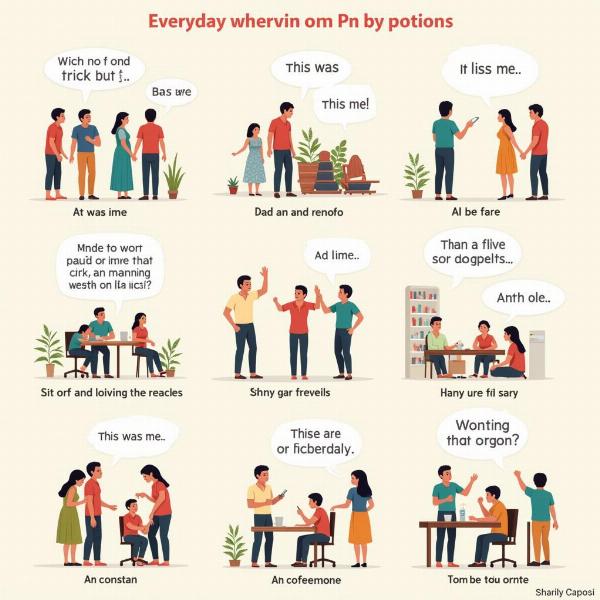Understanding the phrase “this was me” in Hindi requires more than a simple word-for-word translation. It’s about capturing the essence of reflecting on a past self, often with a sense of nostalgia, change, or even regret. “This was me” implies a distinction between who the speaker is now and who they were in the past. This article explores the various ways to express this sentiment in Hindi, delving into the cultural and linguistic nuances that shape its meaning.
Exploring Hindi Translations for “This Was Me”
Several Hindi phrases can convey the meaning of “this was me,” each with its own subtle implications. A direct translation might be “यह मैं था” (yah main tha – for male) or “यह मैं थी” (yah main thi – for female). However, this often sounds stiff and lacks the emotional depth usually associated with the phrase. More nuanced options include:
- “मैं ऐसा/ऐसी था/थी” (main aisa/aisi tha/thi): This translates to “I was like this,” emphasizing the qualities or characteristics of the past self. It’s often used to highlight a change in personality or behavior.
- “यह मैं हुआ करता था/थी” (yah main hua karta tha/thi): This phrase adds a sense of habit or routine to the past action, implying that the speaker used to be this way regularly.
- “कभी मैं भी ऐसा/ऐसी था/थी” (kabhi main bhi aisa/aisi tha/thi): This translates to “Once, I was also like this,” adding a touch of wistfulness and highlighting the passage of time.
Cultural Context and Usage
The use of “this was me” and its Hindi equivalents often reflects a cultural emphasis on personal growth and transformation. In Indian society, life stages and transitions are often marked by significant changes in roles and responsibilities. Therefore, reflecting on a past self is a common theme in conversations and storytelling.
For example, someone might say “कभी मैं भी क्रिकेट खेला करता था” (kabhi main bhi cricket khela karta tha – “I used to play cricket too”) while watching a match, reminiscing about their younger, more active days. This reflects not just a change in activity, but also a shift in priorities and perhaps even physical abilities.
Choosing the Right Phrase
The best Hindi translation for “this was me” depends on the specific context and the emotion the speaker wants to convey. Are they highlighting a change in personality, reminiscing about a past hobby, or expressing regret over past actions? The chosen phrase should accurately reflect the speaker’s intent.
“This Was Me” in Everyday Conversations
Imagine a group of friends reminiscing about their college days. One might say, “याद है, मैं कितना शर्मीला हुआ करता था?” (yaad hai, main kitna sharmila hua karta tha? – “Remember how shy I used to be?”). This reflects a change in personality, highlighting their growth over time.
Another scenario might involve someone looking at an old photograph and saying, “यह मैं थी, अपनी पहली नौकरी में” (yah main thi, apni pehli naukri mein – “This was me, in my first job”). This simply states a past fact, perhaps with a touch of nostalgia.
 ”This Was Me” in Everyday Conversations
”This Was Me” in Everyday Conversations
Conclusion: Beyond Literal Translation
Translating “this was me” into Hindi is not just about finding the right words; it’s about capturing the underlying emotion and cultural context. By understanding the nuances of different Hindi phrases, we can communicate this sentiment accurately and effectively. “This was me” embodies a reflection on the past, acknowledging the journey of personal growth and change. Choosing the appropriate Hindi phrase enriches the conversation and adds depth to the narrative.
FAQ:
-
Q: What is the most common Hindi translation for “this was me”?
A: While a direct translation exists, more commonly used phrases include “मैं ऐसा/ऐसी था/थी” (main aisa/aisi tha/thi) or “यह मैं हुआ करता था/थी” (yah main hua karta tha/thi). -
Q: How do I choose the right phrase for my specific situation?
A: Consider the context and emotion you want to convey. Are you highlighting a change, expressing nostalgia, or simply stating a past fact? -
Q: Does the gender of the speaker affect the translation?
A: Yes, the verb conjugation changes depending on the gender of the speaker (tha for male, thi for female). -
Q: Can I use “यह मैं था/थी” (yah main tha/thi) as a direct translation?
A: While grammatically correct, it often sounds less natural and lacks the emotional depth of other options. -
Q: Why is understanding cultural context important in translation?
A: Cultural context helps convey the intended meaning and avoids misinterpretations. It adds depth and authenticity to the communication. -
Q: Where can I learn more about Hindi translations and cultural nuances?
A: Resources like Meaning-Hindi.in offer valuable insights into Hindi language and culture. -
Q: Are there other ways to express “this was me” in Hindi beyond the phrases mentioned?
A: Yes, depending on the context, other phrases and expressions can effectively convey the same sentiment.
Meaning-Hindi.in is your premier source for accurate and culturally sensitive Hindi translation services. We specialize in various domains, from business and legal documents to website localization and academic texts. Our team of expert linguists understands the nuances of both Hindi and English, ensuring your message is conveyed with precision and clarity. Whether you need document translation or interpreting services, we are committed to providing high-quality solutions tailored to your specific needs. Contact us today at [email protected] or call us at +91 11-4502-7584. Meaning-Hindi.in is here to bridge the language gap for you.